Move over Jay Blades. Meet Edinburgh's repair stars
Inside the tech and textiles business that lives up to the motto 'waste less, live more'
While there might be a few hangers-on to the craze for trading in every iPhone each time a new model is released, most of us these days don’t feel great about tech replacements. Whether it’s reports on the harsh conditions for mineral miners, the environmental impact of using and discarding precious and finite resources, or simply the price amid a cost of living crisis, binning one phone or laptop, and buying another, has many reasons to make us wince.
In 2019 the UK was estimated to produce 1.6 million tonnes of “e-waste” (discarded items which have a battery or a plug) - that’s a staggering 23.9kg per person. Almost one third of this was wasted: going to landfill, incineration or recycling processes which did not recover the precious metals inside. While the UK introduced legislation on the recycling of e-waste in 2013, by 2020 there was still insufficient infrastructure for recycling these products properly.
While all waste is undesirable, e-waste has specific problems. Precious materials such as cobalt, gold, and palladium which are used in electronics are in short supply. Manufacturing electronics with all-new materials requires carbon-intensive mining processes which often have serious workers rights concerns - when in theory these materials can be recovered from old electronics. Moreover, when e-waste is buried in landfill or burned, it pollutes its surroundings with lead, mercury and other harmful chemicals.
Many of us are vaguely aware that we shouldn’t just throw out old electronics; I personally have a dying netbook from 2013, hidden in a desk drawer to stop me from feeling guilty every time I look at it. But what else can we do? Especially in the age of planned obsolescence, there’s only so much repair we can do, or afford, before our tech is simply out-dated.
Going back to the future
Down in Leith, a small social enterprise is providing a solution and demonstrating what the electronics industry could look like. The Edinburgh Remakery has been “Remaking a Difference” since 2012, taking on donated e-waste, repairing and reselling what it can, and responsibly deconstructing the rest for recycling. In 2021, the Remakery estimates that they saved 39 tonnes of electronics from landfill.





